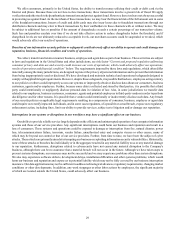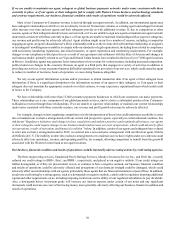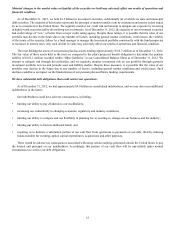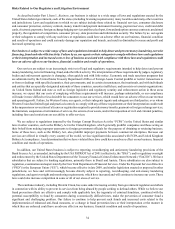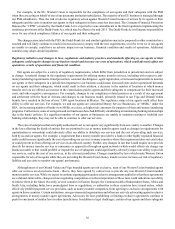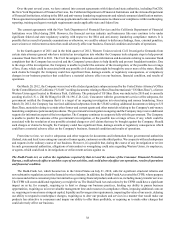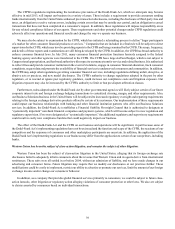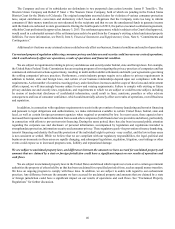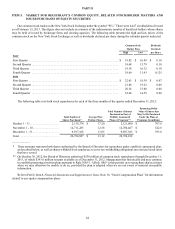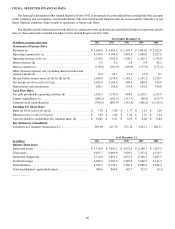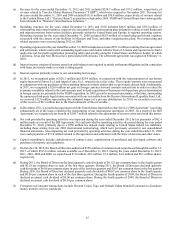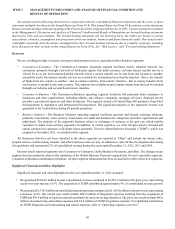Western Union 2012 Annual Report Download - page 43
Download and view the complete annual report
Please find page 43 of the 2012 Western Union annual report below. You can navigate through the pages in the report by either clicking on the pages listed below, or by using the keyword search tool below to find specific information within the annual report.38
Over the past several years, we have entered into consent agreements with federal and state authorities, including FinCEN,
the New York Department of Financial Services, the California Department of Financial Institutions and the Arizona Department
of Financial Institutions, relating to the BSA and anti-money laundering requirements and related consumer identification matters.
These agreements required us to make various payments and to take certain measures to enhance our compliance with recordkeeping,
reporting, training and agent oversight requirements under applicable state and federal law.
The consent agreements with the New York Department of Financial Services and the California Department of Financial
Institutions were lifted during 2008. However, the financial services industry and businesses like ours continue to be under
significant federal and state regulatory scrutiny with respect to the BSA and anti-money laundering compliance matters. It is
possible that as a result of periodic examinations or otherwise, we could be subject to deficiency findings, fines, criminal penalties,
asset seizures or enforcement actions that could adversely affect our business, financial condition and results of operations.
In the fourth quarter of 2011 and in the third quarter of 2012, Western Union received Civil Investigative Demands from
certain state attorneys general who have initiated an investigation into whether the Company took adequate steps to help prevent
consumer fraud from 2010 to 2011. The Civil Investigative Demands seek information and documents relating to consumer fraud
complaints that the Company has received and the Company's procedures to help identify and prevent fraudulent transfers. Due
to the stage of the investigation, the Company is unable to predict the outcome of the investigation, or the possible loss or range
of loss, if any, which could be associated with any possible civil claims that might be brought by one or more of the states. Should
such claims be brought, the Company could face significant fines, damage awards, or regulatory consequences, or compulsory
changes in our business practices that could have a material adverse effect on our business, financial condition, and results of
operations.
On March 20, 2012, the Company was served with a federal grand jury subpoena issued by the United States Attorney's Office
for the Central District of California (“USAO”) seeking documents relating to Shen Zhou International (“US Shen Zhou”), a former
Western Union agent located in Monterey Park, California. The principal of US Shen Zhou was indicted in 2010 and is currently
awaiting trial in U.S. v. Zhi He Wang (SA CR 10-196, C.D. Cal.). Concurrent with the government's service of the subpoena, the
government notified the Company that it is a target of an ongoing investigation into structuring and money laundering. Since
March 20, 2012, the Company has received additional subpoenas from the USAO seeking additional documents relating to US
Shen Zhou, materials relating to certain other former and current agents and other materials relating to the Company's anti-money
laundering compliance policies and procedures. The government's investigation is ongoing and the Company may receive additional
requests for information as part of the investigation. The Company continues to cooperate fully with the government. The Company
is unable to predict the outcome of the government's investigation, or the possible loss or range of loss, if any, which could be
associated with the resolution of any possible criminal charges or civil claims that may be brought against the Company. Should
such charges or claims be brought, the Company could face significant fines, damage awards or regulatory consequences which
could have a material adverse effect on the Company's business, financial condition and results of operations.
From time to time, we receive subpoenas and other requests for documents and information from governmental authorities
(federal, state and local) concerning our current or former agents, customers or other third parties. We cooperate with such subpoenas
and requests in the ordinary course of our business. However, it is possible that, during the course of any investigation or review
by such governmental authorities, allegations of misconduct or wrongdoing could arise regarding Western Union, its employees,
or agents, which could lead to investigations or enforcement actions against us.
The Dodd-Frank Act, as well as the regulations required by that Act and the actions of the Consumer Financial Protection
Bureau, could adversely affect us and the scope of our activities, and could adversely affect our operations, results of operations
and financial condition.
The Dodd-Frank Act, which became law in the United States on July 21, 2010, calls for significant structural reforms and
new substantive regulation across the financial services industry. In addition, the Dodd-Frank Act created the CFPB, whose purpose
is to issue and enforce consumer protection initiatives governing financial products and services, including money transfer services.
The CFPB will create additional regulatory oversight for us. The Dodd-Frank Act and actions by the CFPB could have a significant
impact on us by, for example, requiring us to limit or change our business practices, limiting our ability to pursue business
opportunities, requiring us to invest valuable management time and resources in compliance efforts, imposing additional costs on
us, requiring us to meet more stringent capital, liquidity and leverage ratio requirements, impacting the value of our assets, delaying
our ability to respond to marketplace changes, requiring us to alter our products and services in a manner that would make our
products less attractive to consumers and impair our ability to offer them profitably, or requiring us to make other changes that
could adversely affect our business.



